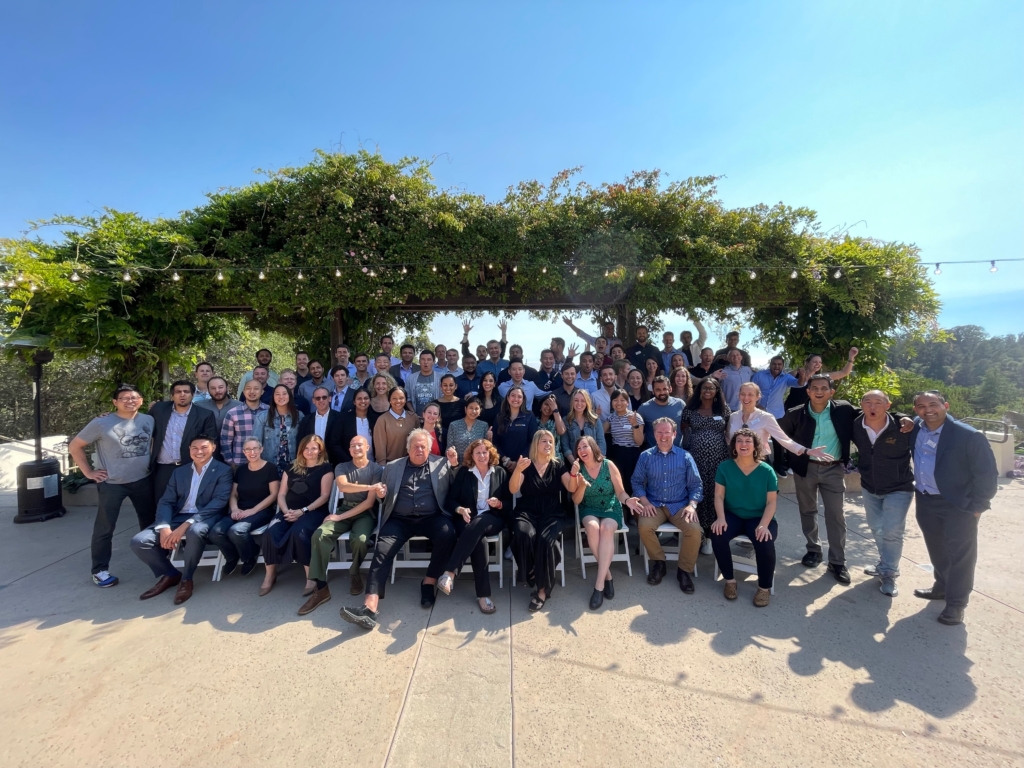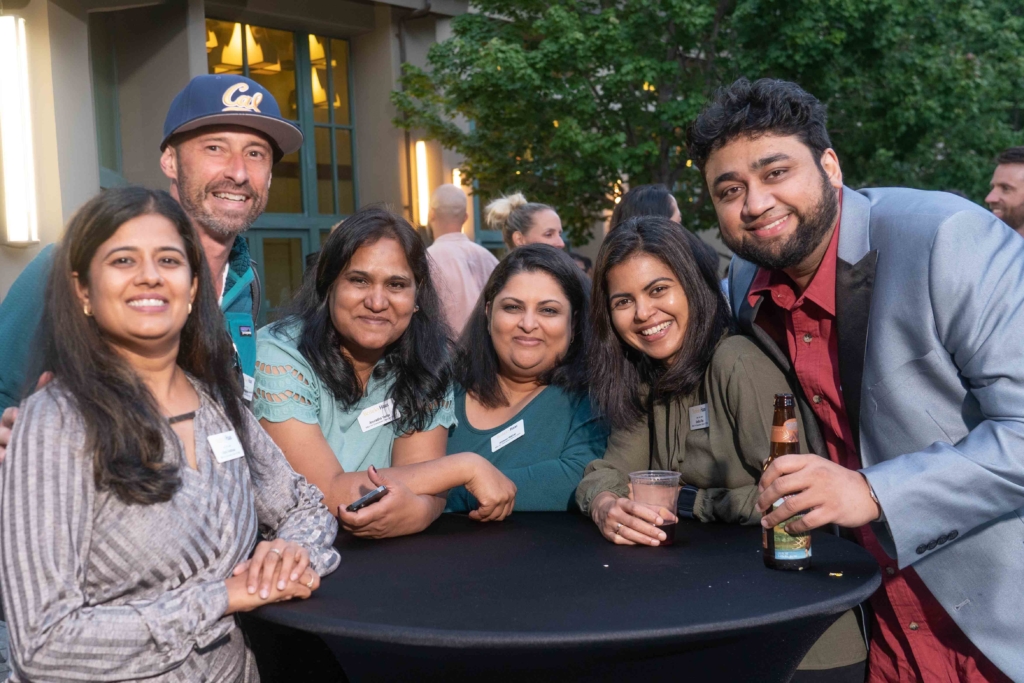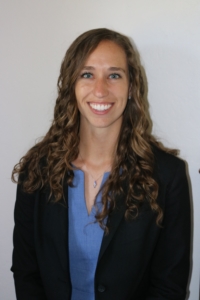
The Haas EMBA Class of 2023 at an immersion week. Courtesy photo
INSIDE THE HAAS FORMAT
The Haas admissions team prides itself on bringing together a diverse class, both in personal demographics and industry represented. The 2024 EMBA cohort has a median age of 38 with a median work experience of 14 years (compared to 12 to 13 years historically). It is 41% women (the highest ever percentage), 8% underrepresented minorities, and 59% were born outside of the U.S. Some 46% come from outside of the Bay Area. Students come from 10 distinct industries, including 12% from tech, 9% from health services, and 8% from retail.
“We continue to have students seek us out,” Breen says. “We used to have primarily a West Coast student population, with some folks from across the country. The last few years, that has grown and now about half our classes are people from outside the Bay Area and the West Coast. That means that students who have a lot of options – Chicago Booth, Kellogg, Columbia, MIT, all these schools closer to their backyards – are traveling to us.”

‘Haas has a strong culture of inclusion and altruism that radiates throughout the faculty, staff and students,’ says Haas EMBA Fiona Baker, class of 2023.
In the latest round of rankings, Haas’ stand-alone program tied with the Wharton School at No. 12 in our composite EMBA ranking for U.S. programs. Our composite is based on U.S. schools’ performance of in the three major EMBA rankings – U.S. News & World Report, the Financial Times, and The Economist – and schools that don’t participate in all three are penalized by our methodology. (Haas was ranked No. 7 by U.S. News’ most recent list, No. 1 by The Economist in 2020, and it did not participate in the Financial Times’ most recent survey.)
Haas’ program is divided into five terms, each about 15 weeks long. The first three are devoted to its MBA core – the same as its other MBA offerings – and the remaining two terms are for electives. Students meet on campus four times each term, typically Thursdays through Saturdays, and complete their course and study group work in between.
Each term includes a weeklong field immersion, another program differentiator:
- Leadership Communications starts the program and is conducted off-site, in a beautiful place, to give students the space to explore and hone their leadership styles.
- In Entrepreneurship, students visit 10 or so different startup companies in Silicon Valley, meeting with the founders and CEOs. “It’s highly immersive because they get access to people they wouldn’t normally,” Breen says. Students get to ask CEOs about the startups’ successes, but also about their failures.
- Similar to the entrepreneurship immersion, students visit different design firms in the Bay Area for Innovation and Design Thinking.
- There’s also an international immersion which currently focuses on sustainability and capitalism
- And finally, for Business and Public Policy, students spend a week in Washington, DC, studying how business and politics work together.
The immersion weeks developed out of the Colombia partnership when students went to New York City for week long classes, and officials say they continue to set the program apart from other EMBAs on the market.
“The international component focused on sustainability and capitalism, I think is unique. This is something that is really important to our student population, and it’s important from a global standpoint,” Stanners says. “Many of the firms and industries our students work in are global. Providing them the opportunity to see how issues like sustainability and capitalism are navigated on the global scale is invaluable.”
WILL HAAS JOIN THE ONLINE BANDWAGON?
One question facing many EMBA programs around the country: When and if to offer more online and hybrid flexibility?
In August, Wharton made a huge splash in the online waters announcing a new Global EMBA that would be 75% virtual – the first of the big five schools to make such a move. Northwestern’s Kellogg’s digital pioneer, Mohanbir Sawhney, told P&Q that he believes the future of exec ed, including EMBAs, is omnichannel – a mix of in-person and online experiences chosen by the student. And Emory University’s Goizueta Business School welcomed its first fully online EMBA cohort in August, making it the highest-ranked program to create a 100% online EMBA so far.
“We’re all looking at what happens online and asynchronous models, but we do not have any plans at this point,” Breen says.
This spring, Haas did introduce a flex cohort for its evening and weekend MBA which allows students to take all their core classes online. Electives can be taken online or on campus, and students are only required to travel for three immersion events. It is also building a portfolio of online electives available to all of its MBA students, including EMBA students if they choose, Breen says.
“Wharton’s announcement, certainly, has us all watching. It’s a question coming out of the experience in the pandemic as people have gotten more comfortable with remote learning, certainly synchronous remote learning,” Breen says. “I think that’s an opportunity that we’re all looking at: How do we best deliver the Haas content and the Haas experience?”
A QUESTION OF STUDENT PREFERENCE
The question of online versus in-person ultimately comes down to student preference. Take Golfin, for example. The year he was accepted to Haas, he also happened to get married, and is now expecting a baby any day. Online opportunities would certainly help with scheduling, but he chose the Haas EMBA for the in-person experience.

Fiona Baker, Haas EMBA ’23
“(Online) takes away from the lifelong friends and relationships we are making each block and grabbing lunch, dinner and a beer with your cohort on the weekends is one-of-a-kind,” he says. “It is hard to describe, but I have never felt so connected to a group of strangers like I have felt connected to my class. I already know that all 76 of us will be friends and colleagues for the rest of our lives. The format allows us to be present when we are together and to foster relationships when we are away. This is the future of graduate education.”
Baker agrees. The most valuable part of the Haas experience so far was during orientation, when a guest speaker told students to build their own personal Board of Directors, a trusted group of advisors as you work your way through life. Several of the people on her board are EMBA classmates she met through the in-person format.
“My cohort is driven but not competitive, intelligent but not arrogant, inquisitive for new insights, and seeks societal advancement in addition to personal growth,” she says. “EMBA students by nature of the program bring with them a wealth of knowledge that you as a peer get to tap into. Haas’ admissions team did a great job of building a cohort from a diverse array of industries and positions which means that in each course there are people in the room who have or are living the realities of the cases or lessons we’re learning.”
DON’T MISS: TOTAL COST AT P&Q’S 2022-2023 TOP-RANKED EXECUTIVE MBAS AND EMBA SPOTLIGHT: EMORY GOIZUETA’S PURSUIT OF FLEXIBILITY





Questions about this article? Email us or leave a comment below.